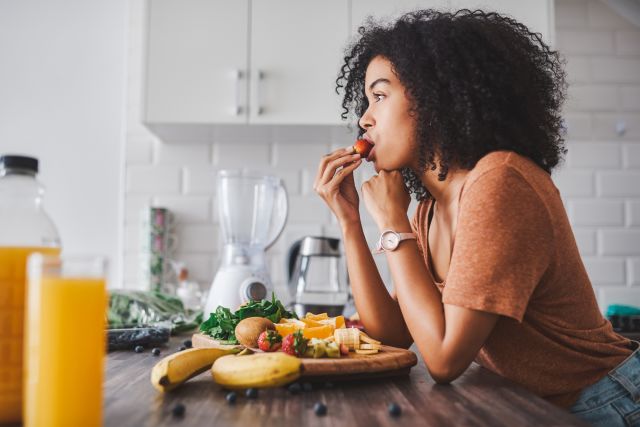Updated on April 8, 2024.
From artificial colors to added sugars to excess fat, the average American diet may include ingredients that can harm health and increase the chances of developing cancer.
But with some adjustments, it may be possible to avoid foods that could harm your health. Here are research-backed eating habits to build into your routine that may help lower your cancer risk.
Skip sugary breakfast cereals
Choose whole grains like unprocessed oatmeal or bran for breakfast, instead of sugary cereal. A 2018 study published in the journal BMJ that looked at the eating habits of more than 100,000 French adults for eight years found that ultra-processed foods led to a 10 percent increased risk in breast cancer and cancer overall.
Sugary cereal contains refined sugars, which have excess calories and cause a quick increase in blood sugar, followed by a sudden decrease in blood sugar that may cause a surge in your appetite. Those extra calories can contribute to weight gain and obesity.
A 2020 study published in the journal PLOS Medicine looked at changes in the BMI (body mass index, which uses weight and height to estimate body fatness) of 110,000 French adults who frequently ate ultra-processed foods like chips and french fries between 2009 and 2019. Researchers found weight gain and a greater risk of becoming obese among the participants. Obesity is known to increase the risk for 13 different types of cancer.
Regularly eating fiber-rich grains, on the other hand, may help reduce your risk for certain cancers. These include oatmeal and bran, both of which have healthy amounts of fiber.
A 2019 study published in the journal Food Science & Nutrition looked at whole grains versus refined grains and found that eating whole-grain foods was linked to lower risk of developing gastric (stomach) cancer. Refined grains—like white bread and packaged cereal—were tied to increased risk of stomach cancer. Other research has shown that eating healthy amounts of fiber is also linked to a decreased risk of colorectal cancer (which affect the large intestine and rectum, or last several inches of the large intestine) and breast cancer.
Avoid processed meat
A 2020 study published in the journal International Journal of Epidemiology looked at people’s diets and the amount of red and processed meat they consumed per day. Results showed that regularly eating three to four slices of bacon per day was associated with 19 percent increased risk of colorectal cancer. Results also suggested 20 percent higher risk of colorectal cancer when eating 76 grams per day of processed meat—equivalent to roughly four breakfast sausages. After reviewing a number of studies, the World Health Organization in 2015 classified red meat as a possible carcinogen (cancer-causing substance), and processed meat like bacon as a carcinogen.
Instead of breakfast meats, try savory salsa or fresh tomato slices with eggs. Tomatoes get their red color from a chemical called lycopene. Lycopene has been associated with a lower risk of cancer of the prostate, a male reproductive organ that makes semen and is found below the bladder. An April 2017 review published in Prostate Cancer and Prostatic Diseases looked at all studies done on lycopene and prostate cancer published before 2016 and found that eating high amounts of lycopene is associated with a lower risk of developing prostate cancer. In fact, a 2014 study published in the journal Cancer Epidemiology and Prevention Biomarkers found that men who ate over 10 servings of lycopene-rich foods per week had an 18 percent lower risk of prostate cancer.
Research suggests that lycopene may help fight cancer by stopping it from spreading in the body. A 2020 study about the molecular arrangement of lycopene suggested that it may prevent cancer cells from dividing and multiplying. Lycopene may also promote the death of prostate cancer cells.
Avoid red meat
Excessive intake of red meat has been linked to higher rates of cancer and cancer death in general. A 2021 study published in European Journal of Epidemiology that analyzed the results of 148 past studies found that cooked red meat is associated with a higher risk of colorectal cancer, lung cancer, and kidney cancer.
Some research has also linked red meat consumption to changes in genes that may lead to cancer. An October 2021 study published in the journal Cancer Discovery suggests that diets high in red and processed meat may cause genetic mutations, leaving DNA damage that could lead to the growth of cancer.
Try substituting red meat for a healthier protein like chicken, turkey, or salmon. The vitamin D and omega-3 fatty acids (substances that have been linked to better immune function) in fatty fish like salmon, trout, and mackerel may help protect against cancer.
A 2014 study published in the journal Nutrition and Cancer suggested that a diet high in omega-3 fatty acids from fatty fish was linked to reduced risk for colon cancer. Results suggested that omega-3 fatty acids may block the production of a hormone involved in the growth of a type of cancer called adenocarcinoma (the most common type of colorectal cancer). Another study published in 2015 in the journal Scientific Reports looked at diet and risk for colorectal cancer. Results suggested that regularly eating sea fish was linked to 21 percent decreased risk of colorectal cancer, and that regularly eating freshwater fish was tied to 53 percent decreased risk of colorectal cancer.
Avoid sugary drinks
Regular soda is loaded with a variety of sweeteners, and many products get up to 60 percent of their sugars from fructose. This type of sugar is associated with obesity, type 2 diabetes, and tooth decay. According to the National Cancer Institute, obesity or overweight is linked to double the risk for gastric cancer, liver cancer, and kidney cancer. Additionally, people who are obese who survive cancer are at a higher risk of developing a second, unrelated cancer. Avoiding soda and other sugary drinks may help with weight management and improve overall health.
Some zero-calorie sweeteners have also been linked to health risks such as weight gain, digestive problems, and heart problems. Instead of substituting sugary drinks with diet beverages, drink water instead. Try crisp sparkling water and add lemon juice, crushed fruit, or mint for flavor.







